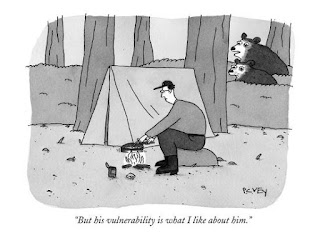Out of Faith or Out of Fear: On what do you base your actions?
The Merriam-Webster
has some very interest definitions of faith.
1Faith can be an allegiance to duty, loyalty, fidelity, a belief or
trust in God, or a firm belief in something for which there is no proof. When it
comes to the Biblical meaning of faith, the passage in Hebrews 11 comes up in
most people’s minds:
‘faith is the substance
of things hoped for, the evidence of things not seen’
Hebrews 11 vs 1
The passage
continues to speak about all manner of things that would not happen without
faith; the most important being:
‘But without faith
it is impossible to please Him: for He that cometh to God must believe that He
is, and that He is a rewarder of them that diligently seek Him.’
Hebrews 11 vs 6
Taking this passage alone into account; what does it mean to act
out of faith or fear?
Personal experience
has taught me that in most cases, the most common reaction is one motivated by
fear. Think about it; a car driving in your direction leaves its lane and starts
heading straight for you, what motivates your next action? An escaped lion
wanders into your back yard as you are sunbathing, what will motivate your reaction?
I can bet it will not be faith.
These are very
basic examples of the normal human reaction to danger, we are wired for self-preservation.
Even a toddler can know to stay away from the sharp end of a household pet
without being told. It is part of the human makeup.
And as part of our
nature, we tend to do this in not just the basic areas, but in almost everything.
How many times have you heard of someone turning down a really good job because
they were not ready to leave their hometown for fear of the big city? Or the eighty-something
year old who refuses to retire for fear of loneliness and loss of purpose. Many
examples can be used which illustrate just how much our lives are generally
being guided by an internal fear.
And yet, the Bible is asking us, or rather telling us in very
strong terms, to go against the natural grain and believe in One whom we have
never seen. I think this is asking a lot from a people who are set in making
decisions out of self-preservation.
People are taught
that ‘your happiness is the only thing that matters,’ ‘if you are not happy
then the relationship is not worth it,’ ‘always look out for number one,’ and I’m
sure you can think of many more examples.
But Paul is saying
the opposite, ignore what you know and
can see with your own eyes, and base your life instead on what you believe. In order
to do this you must of course have something to believe in right? If you
believe in Budda for example, your faith in him must be so concrete that it
overrides your natural desires. So if Budda speaks of promoting peace at all
times, you must be able to go against the natural desire to scream abuse at the
driver who cuts in front of you while driving down the highway, why? Because
your faith in what your Budda says is more real to you than what you have in
your human knowledge.
The same applies
to us, the believers of Jesus Christ. We have to daily, constantly choose to
set aside our natural reactions that are grounded in fear, and instead turn to
what truth we have been given in God’s
word. This is often easier said than done.
When faced with
the prospect of losing something I had just found this week, I found myself
deep in a mess that I created in my clever ingenuity. You see, I believed that
just because I prayed about the situation, every action regarding it would be
approved by God. It was not. I was so afraid
of missing out that I did things that I believed would secure my position -which
I was so afraid of losing. In the
process, I made a mess of a what would have otherwise been a very
straightforward course.
Lesson learnt? Faith
is an inoculant of fear. Faith is the natural, innate, first hand reaction of
the reborn Christian. It does not become that way automatically, but rather
through the diligent work of the Holy Spirit on our willing lives.
Learning something
often requires repetition, and so becoming a faith-led person will require
constant conscious effort to choose faith in place of fear. If I had chosen
faith in my actions this week, I would have asked for God’s guidance and then
waited to be given instruction knowing that He would certainly do so. I would
have exercised patience because I would be confident in my faith on what I hope
for but have not yet seen.
Choose faith
because it is so much easier than fear. Choose faith because it cuts out the
mess that your clever ingenuity will produce – and which you will have to clear
up. Choose faith because the more you do it the more it will become your
nature. Choose faith because faith will make you stronger, while fear will
continue to leave you weak and helpless.
Choose faith because
it is the only way to truly please God.


Comments
Post a Comment